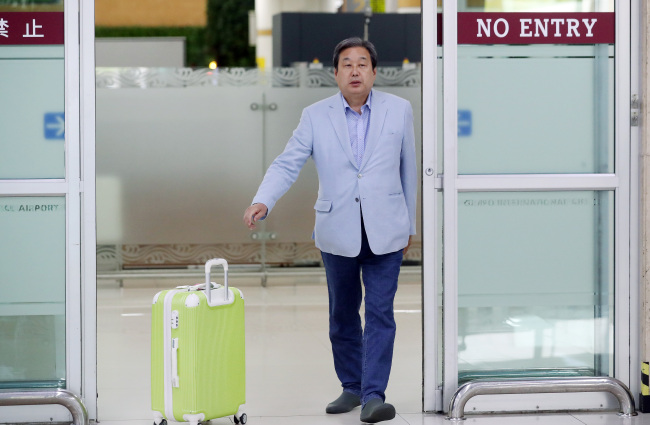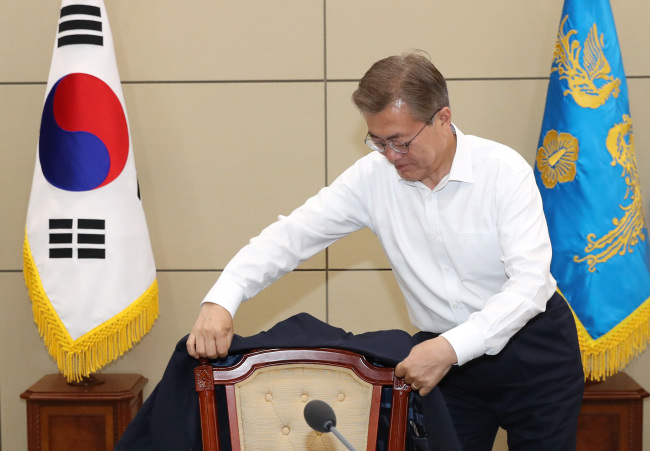‘No look pass’ and Korea’s culture of excessive protocols
Viral video of Korean lawmaker raises question on where to draw the line
By Rumy DooPublished : June 15, 2017 - 15:55
Korea’s culture of upholding meticulous protocol has come into the spotlight since a video featuring a Korean lawmaker’s “authoritarian no-look pass” went viral last month.
In the clip, Rep. Kim Moo-sung is seen nonchalantly passing his suitcase to an assistant waiting at the airport arrival gate, without even looking to see where the bag will roll. The assistant receives the suitcase and hurriedly removes himself from the camera frame.
In the clip, Rep. Kim Moo-sung is seen nonchalantly passing his suitcase to an assistant waiting at the airport arrival gate, without even looking to see where the bag will roll. The assistant receives the suitcase and hurriedly removes himself from the camera frame.

The internet buzzed with criticism of Kim, noting his smooth action betrayed how he must treat his subordinates. Reports rolled in of more instances of excessive protocol and comparisons to other countries.
“In Korea, if you become an officer in the military, you are awarded a car and a driver,” Rep. Kim Jong-dae posted to Facebook on June 2. “In the US military ... subordinates do not carry bags for those in higher positions, no matter how high in rank they are.”
Television shows and reports shed light on the lives of Swedish lawmakers, who have no personal assistants, take the subway and are not protected by parliamentary immunity.
“Swedish lawmakers do not consider themselves privileged,” Korean adoptee and Swedish lawmaker Jessica Polfjard said at an interview in Korea in May. “Lawmakers cannot receive presents that exceed 40 euros ($45). We receive only minimum fees for overseas trips, and we have to reimburse a certain amount if we’re treated to meals.”
In Korea, because of strictly observed hierarchies, secretaries and assistants make a clear distinction in dealing with local higher-ups and those from abroad.

“Here, secretaries are expected to pour their heart and soul into caring for their bosses,” according to Lee Joon-eui, CEO of the Korea Followership Center, a training center that offers courses in office protocols such as formal greetings and business etiquette.
The difference stems more from a state of mind than physical manners, which are growing increasingly standardized around the world, said Lee, who himself used to be secretary to a CEO.
Global standards exist for car seating, shaking hands, the order in which people are to be introduced, and so on.
“But the problem is that Korean authority figures expect personal devotion beyond the professional scope, in private matters.
“From the management’s perspective, what’s more beneficial for an organization is belief and pride in the system, rather than loyalty for one individual,” he said.
Protocol, etiquette and formalities were created to ensure safety and facilitate communication, writes Lee Kang-rae, an adjunct professor at Yonsei University, in his book about his time as the Blue House chief of protocol during the Lee Myung-bak administration.
According to historian Shin Jung-il, protocol that reflects a mix of military rules, Confucianism and Japanese etiquette entered Korea after the country’s liberation from Japan.
“The new leaders sought to legitimize their authority, and imposing strict protocol was one way of doing that,” he said.
Today, more relaxed protocols are being spotted, reflecting the changing times. The new Moon administration, for example, seems intent on tearing down the practice of excessive formalities.
The day after Moon was elected, he refused to be assisted by a bodyguard when taking off his jacket at a luncheon. Moon has also been photographed enjoying coffee breaks with his staff, taking selfies with the public and yielding the road for ambulances to pass by.

At last week’s ceremony appointing Kim Dong-yeon as the new finance minister, Blue House staff surrounded Kim, clapped and handed him a bouquet of flowers. It had previously been customary to have Blue House staff stand in a single file next to the chief presidential secretary.
“There are countries that impose even stricter protocol for important events,” said Kim Sung-cheol, CEO of bodyguard firm MSAT. “But it is always done in a way that does not impede communication between employees and the VIP.”
By Rumy Doo (doo@heraldcorp.com)



![[AtoZ into Korean mind] Humor in Korea: Navigating the line between what's funny and not](http://res.heraldm.com/phpwas/restmb_idxmake.php?idx=644&simg=/content/image/2024/04/22/20240422050642_0.jpg&u=)

![[Exclusive] Korean military set to ban iPhones over 'security' concerns](http://res.heraldm.com/phpwas/restmb_idxmake.php?idx=644&simg=/content/image/2024/04/23/20240423050599_0.jpg&u=20240423183955)

![[Herald Interview] Why Toss invited hackers to penetrate its system](http://res.heraldm.com/phpwas/restmb_idxmake.php?idx=644&simg=/content/image/2024/04/22/20240422050569_0.jpg&u=20240422150649)
![[Graphic News] 77% of young Koreans still financially dependent](http://res.heraldm.com/phpwas/restmb_idxmake.php?idx=644&simg=/content/image/2024/04/22/20240422050762_0.gif&u=)






![[Exclusive] Korean military to ban iPhones over security issues](http://res.heraldm.com/phpwas/restmb_idxmake.php?idx=652&simg=/content/image/2024/04/23/20240423050599_0.jpg&u=20240423183955)



![[Today’s K-pop] Ateez confirms US tour details](http://res.heraldm.com/phpwas/restmb_idxmake.php?idx=642&simg=/content/image/2024/04/23/20240423050700_0.jpg&u=)